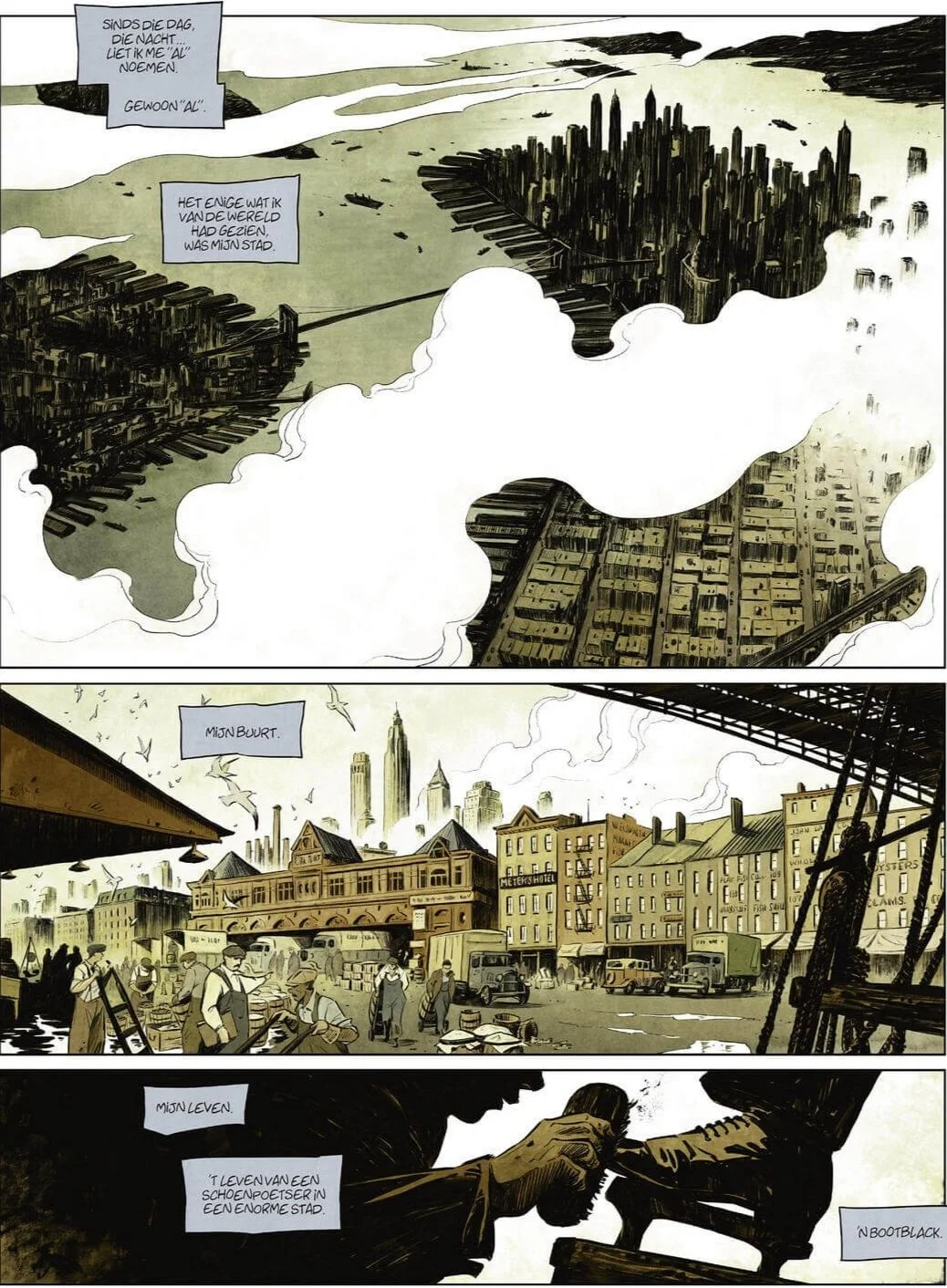Writer / Penciller / Colour Artist: Mikaël / Letterer (UK edition): Chromatik Ltd. Translation: Matt Maden Design: Philippe Ghielmetti HC / nbm Graphic Novels
The Pitch: Spring, 1945: the war leaves only death and destruction in its wake. To escape the horror of the present, Al, an American soldier, the only survivor of his unit, immerses himself in the memories of his New York life. Son of German immigrants, born in the United States, he was not yet ten years old when, in one night, under the approving eyes of anti-immigrant Americans, he lost his parents and his home in a terrible fire. Turning his back on his origins, Al has no choice but to live on the streets; he becomes a Bootblack, a shoe shiner. New York offers no future for the poor, Al understood that. He is therefore determined to earn more money, whatever the means. But he does not imagine, at that point, that the war which threatens will soon give him an appointment with his past...
The beginnings of cultures in urban spaces are the beginnings of those spaces themselves. That is to say, history lives and breathes in the movement of people. People like Al Chrysler, the lead of Mikel's excellent historical fiction. We meet Al Chrysler (in truth, Altenberg) as a soldier but move quickly to his youth and the way that the terrible history of New York to puts him where he needs to be. His apartment, a tinderbox, burns and kills everyone, including his parents. Believed dead, he gets to begin again, only no less desperate, hungry, or cold. Especially since the only warmth would come from that all-consuming fire. Altenburg burns so Al can live. From the very beginning, we have a character in Al who rejects his identity. He wants to be American, not German. In fact, the whole piece can be seen as a rejection of nationality as identity. He chooses the American dream, rather than the German one. Although, how different are they really? Grow, make money, fall in love... What his dream really is... At its core, is to have a stake of his own and not to be in anyone's debt. To choose his own destiny. This is challenged by other teens, other bootblacks, and eventually, by the mob.
Altenburg burns so Al can live.
It's here that the book, despite its distinctly European roots, becomes the most American. Al has to outwit and outmaneuver, even as a more powerful specter forms on the horizon: the second world war. Even as Al looks for a possible way out, a path to his dreams, the undeniable force of both the law and the war conspires against him. His break for freedom is kneecapped and he finds himself once more at the bottom of the heap rather than the king of it: A private in the American army, once more rejecting his roots, fighting against his homeland brothers. At every turn, the book puts Al in this position, seemingly to teach him a lesson he just won't learn - that ultimately, you must stand alone. And that it may just be better that way. Mikel moulds history to his advantage, just as Al does with his soundings. Al takes the name of NYC's newest, shiniest monument - The Chrysler Building - as his own. The tenement fires that were a frequent feature of the 1900s, the War that would alter America's relationship with Europe... All are now the backdrop, the tableau of Al's life and decisions. Choices he makes often for the wrong reasons, relying on the wrong people. He remains haunted by these choices, by his enemies, and by Maggie, the woman he foolishly thinks he loves, all throughout the book.
Evoking the spirit of Will Eisner.
Mikel invokes the spirit of Will Eisner in his gorgeous, strip-backed palette. He manages to often create a minimalist look, but capture maximum detail. He has a fine, steady line and a brilliant sense of space, architecture, and depth of field. What's out of the panel is just as important as what's in. You can feel the care and love of New York's history, its melting pot of cultures, and the shadow it casts on the world in every ink line. The book has the look of the Godfather or Once Upon A Time In America but moves at a less stately pace. Keep your MCU. This is the one that should be snapped up to be a movie, coming soon. Bootblack shows us that immigrants are not just people on the move, or tourists overstaying a welcome. They are escapists, running, like all of us, from the beast that is being alone, being unwelcome, and being told you're not good enough.
Bootblack is available now from your local comic shop.



